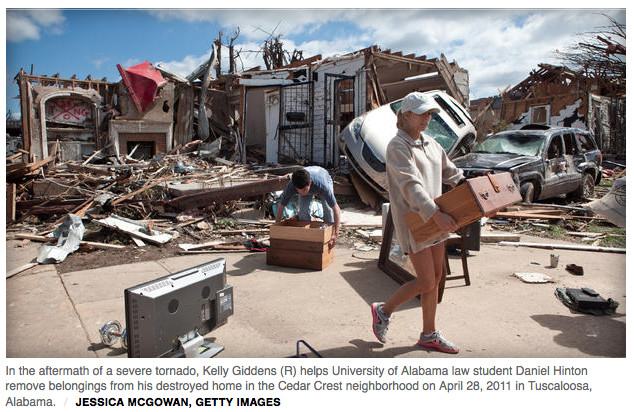A new study for the first time found that smoke from fires as far away as Central America can make tornadoes here in the United States more dangerous.

"These results are of great importance, as it is the first study to show smoke influence on tornado severity in a real case scenario," according to Gregory Carmichael, professor of chemical and biochemical engineering at the University of Iowa and co-author on a paper about the findings in the journal Geophysical Research Letters.
The study authors seized on the fact that on the day of these tornadoes the satellite data showed that smoke from eastern Mexico and the Yucatan Peninsula had drifted across the Gulf of Mexico and into the region. Wondering if this smoke, presumably from intentionally set fires, could have impacted the formation of the tornadoes, they compared models in which smoke was factored into the formation of tornadoes and to those where it was absent.
They found that smoke lowered the base of the clouds and increased wind shear, which together increased the likelihood of more severe tornadoes.
The results mirror the findings of other studies that have shown that pollution in the atmosphere - largely from developing countries ranging from the Amazon to South Asia, where people use fire to clear fields for farming and commercial plantations - can wreak havoc on weather.
A 2004 study in Science found that smoke from forest fires in the Amazon causes precipitation to rise from 1.5 kilometers to 5 kilometers, setting off intense thunderstorms. Another study in Nature in 2011 found that emission of black carbon and other aerosols - mostly from such things as transport, burning of fossil fuels and fires from land clearing - intensified the strength of cyclones in the Arabian Sea, especially off the coast of Oman which has not historically seen strong cyclones.
Carmichael's co-author Pablo Saide pointed out that the study was not suggesting that smoke alone could create the conditions for tornadoes, which depend primarily on temperature, moisture and wind.
"Even without the smoke, you would still get a very strong outbreak,"said Saide, a postdoctoral fellow at the Center for Global and Regional Environmental Research, in reference to the 2011 storms. "But the presence of smoke intensifies those conditions. It made it more likely that you would have tornadoes and a higher chance of having stronger tornadoes."
Greg Carbin, a warning coordination meteorologist at the NOAA Storm Prediction Center in Norman, Oklahoma, said it was "stretch" to suggest smoke could made these tornadoes more severe. He also had other concerns about the study, including the fact that it was based on such an extreme tornado event and that some of the modeling actually suggested smoke weakens some aspects of storms.
'The title of the paper is misleading. Their finding are somewhat contradictory. I'm not the only one with concerns. There are others who are concerned about this," Carbin said, referring to the title that suggests smoke increases severity of tornadoes.
"It seems to be hard to use that particular event and say it was that way because of smoke," he continued. "I think there are many other atmospheric factors that go into making that particular tornado outbreak the most prolific in 37 years. It's a stretch to use smoke and soot as reason why that was the case."
While this study only looked at one event, the authors said their findings could play a role in future weather forecasts.
Currently, smoke is not factored into weather forecasts.
"We show the smoke influence for one tornado outbreak, so in the future we will analyze smoke effects for other outbreaks on the record to see if similar impacts are found and under which conditions they occur," Saide said. "We also plan to work along with model developers and institutions in charge of forecasting to move forward in the implementation, testing and incorporation of these effects on operational weather prediction models."
Even with his doubts about the study, Carbin agreed one day it would make sense to factor in smoke and other aerosols into weather forecasts.
"I would argue the more information we have about the atmosphere the better," Carbin said. "If that includes aerosols, smoke and other components of observational information about what is going on the atmosphere, it is quite likely that the forecast will improve. The reason we don't is that it's difficult to assess and acquire these types of observations and it probably would be somewhat computationally expensive to do so. Those expenses will come down with faster computing."
To build on their findings, Saide said they plan to start looking beyond smoke from fires and looking for a connection between air pollution in American cities and violent weather.
"This is one case. We want to do more cases in future to see if this is consistent and see what are the conditions where the effects happen," Saide said. "Is it for every tornado outbreak? The most severe ones? We need to study that."